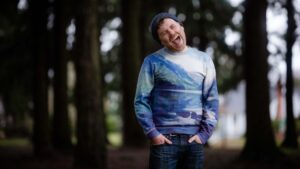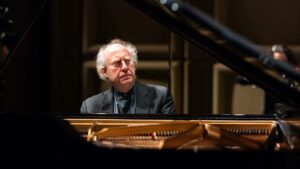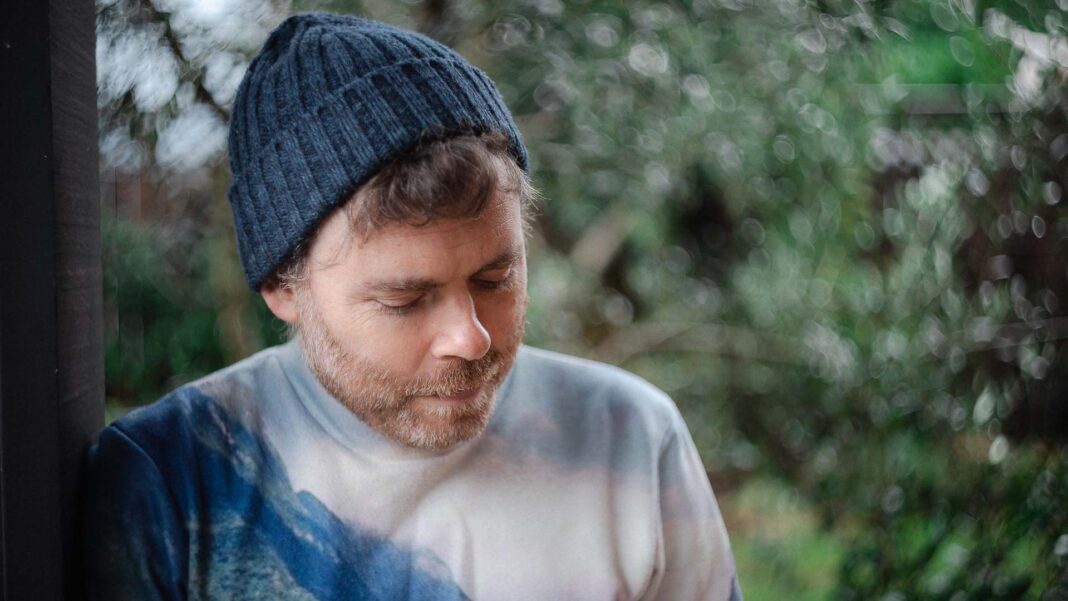
Last month we posted the first of two interviews with composer/singer/songwriter Gabriel Kahane. That interview touched on the political side of his work. This weekend the Los Angeles Chamber Orchestra is performing his piano concerto entitled Heirloom as part of two concerts. It was written for his father, pianist and conductor Jeffrey Kahane and it looks at three levels of inheritances within his family.
In our conversations about Heirloom, Kahane revealed what it’s like composing for his father, the family stories that find themselves in his piano concerto and about the “existential muck of being human.”
What follows are excerpts from our conversation that have been edited for length and clarity. To see our full interview with Gabriel Kahane, please go to our YouTube channel.
You wrote on your Tumblr account about your piano concerto, “I keep putting it off in large part because I’ve never felt comfortable with large scale instrumental composition.” Did writing Heirloom help you overcome that discomfort?
I still feel ike a bit of an imposter when I’m writing instrumental music. My friend Eric Jacobsen, founder and conductor of The Knights and [Music Director] of the Virginia Symphony Orchestra and the Orlando Philharmonic Orchestra, had been nagging me for years to write something for my dad. I had resisted and resisted. Fnally I said yes. We put together this consortium of six orchestras. Just when it was about time for me to start sketching the piece, I was in Chicago to do emergency shelter intake form there and my dad was playing the Gershwin Concerto.
There was a pre-concert talk and the the person conducting the pre-concert talk asked my dad, “What makes the Gershwin concerto so special?” And my dad said, “The miracle of the Gershwin concerto is that it sounds like Gershwin.” By which he meant as much as Gershwin was steeped in the music of his more formal contemporaries, and as much as he admired that music and felt himself to be an impostor and in the shadow of that music, he managed to write this concerto that we would all say sounds like Gershwin. It sounds like Gershwin the songwriter.

I realized in that moment that that was what I wanted to do. I wanted to write a piano concerto that sounded not like Andrew Norman or Tom Adés or Missy Mazzoli, but like me. And so the musical challenge was how to translate my language as a songwriter into a concert work without it sounding sort of retrograde or neo-classical.
I would say that it did help me to get over some of that feeling of imposter syndrome in as much as just treating melody as though it were a vocal line. When I’m writing vocal music I feel very comfortable. Writing for a symphony orchestra it’s in the absence of text that I become unmoored. I think that one of the things that helped me with writing Heirloom was to just think of those melodies as being vocal lines.
Then to sort of take these three inheritances: the musical inheritance from my parents to me, my father’s inheritance from his mother who fled Germany and then finally my older daughter’s inheritance. We don’t know what that’s going to be yet, except that she’s as stubborn as I am.
Did writing Heirloom change your relationship with these various inheritances that you’re exploring in the three movements?
That’s a great question. No. Not particularly. That’s in part because I think if composers are being honest, whenever we assign a program to abstract instrumental music, we’re always doing a little bit of myth-making. I think that in the case of this piece the sort of non-musical subject matter really is there. But it’s not like I was doing therapy as I’m sitting at the desk. Like now I understand my father.
I think that the slow movement, which is the movement for my grandmother, has kind of surfaced in a number of pieces: my first piece that I wrote for the LA Phil back in 2011 called Orinoco Sketches. Then in the penultimate song from Book of Travelers, which is called Port of Hamburg, in which I set some of her diary from the time that she was leaving Germany and coming to the United States.
I think that really sort of feels like the emotional center of the piece for me. I was very close to her. She was an extraordinary person who went through a lot to get where she was at the end of her life. I feel like it’s a nice musical testament to her life.
Writing for your father, this is not the first time you’ve done that. He commissioned Django: Tiny Variations on a Big Dog from you. You two also collaborated in 2013 on a “curated mixtape concert” as part of the Chamber Music Northwest’s Summer Festival. Now you’ve written this piano concerto, Heirloom. I have to think that creates a special relationship between you and your father that is probably unique among other composers. Where do you think this journey has taken the two of you?
Oddly because we share DNA, it’s always been the case whenever he and I work together – he’s also conducted a few pieces of mine – there’s actually less conversation or interaction than there would be with someone who’s not a blood relative.
Among his gifts as a musician is the ability to elevate and transcend what’s on the page with anyone’s music. I’ve always felt this with him both as a pianist and as a conductor. He is a dream interpreter because his musicianship is just so kind of peerless. Whatever you wrote he is going to make it sound better than it was.

On top of which, he and I are related. So he gets my music at a very, very deep core level. Because I am a part of him and he is part of me. So really the only conversations that we had were that there were a couple spots where he said, “You know, I feel like this is sort of pianistically underwritten. Can you thicken it up a little bit?” He also had some notes in the first draft about places where he thought that the orchestration is too fussy. And I was like, “No doubt it’s fine.” Then we got through the premiere and I was like, “Oh, he was right.”
So did you make changes?
I did one revision between Kansas City and Oregon. And now in the last ten days of the year I’m planning one more revision so that hopefully L.A. audiences are getting what I hope will be the the final draft, although it could change. There are still a few more orchestras to do it. So we could say, once it happens, it could be the world premiere of the final version of it.
Could be?
I am kind of a chronic tinkerer. This is a piece where the first movement is kind of a beast; it’s 15 minutes long. The second and third movements feel like they work pretty well. I’m just hoping to understand better what the journey of that first movement is. I don’t generally work in long form. I’m a songwriter. So 15 minutes feels a little bit like a run on sentence right now. I’m trying to clarify that.
You did an interview with the Portland Monthly when you became the creative chair of the Oregon Symphony. In it you talked about “the existential muck of being human.” How does your work allow you to be more in touch or more accepting of that existential muck?
I’m going to be honest. The thing that most puts me in touch now – in this moment – with the existential muck of being human, is that in 8 minutes I get to go be a dad to my two daughters who are four and one. Our younger daughter just turned one a few days ago. It’s just really humbling being a parent. People say that, but I think the reason that it feels so humbling is that you’re just trying to keep them alive and teach them to be kind. That never ceases to amaze me. I think also being a parent just puts a lot of things in context.
The Right to Be Forgotten [his folk opera in one act], which is a piece we didn’t really touch on, deals more deeply with the idea of professional jealousy and the relationship between the internet and professional jealousy than anything that I’ve done before. It’s something that I think most of us in the era of social media wrestle with because social media is nothing if not an invitation to feel dissatisfied with our accomplishments.
But I find that being with my daughters, as they’re discovering in their different phases of childhood how to be in the world and my one-year-old looking out the window and seeing snow for the first time, it just reminds me how overly self-serious one can be and how messed-up our priorities and sense of hierarchical construction in the world are. So certainly music, songwriting, composing, have helped me to make sense of the world.
But in this particular moment, the thing that most makes me make sense of the world is being a parent. To try to not mess it up too badly. That is the same thing every working parent has to deal with, whether they’re a secretary or a composer or a garbage collector. It’s just that struggle that everybody has.
This interview took place on December 12, 2022. To watch the full interview with Gabriel Kahane, please go here.
Main Photo: Gabriel Kahane (Photo by by Jason Quigley/Courtesy MKI Artists)
Correction: We previously quoted Gabriel Kahane as having said his father commented that the concerto was “genetically” underwritten. In discussions with Mr. Kahane he clarified he said “pianistically.” We apologize for the error.











